Yaqub al-Charkhi
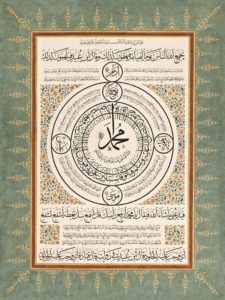 I have known God and I see none other than Him
I have known God and I see none other than Him
So that the ‘Other’ inus is shut out.
Since I realized unity, I no longer fear separation;
This day I have arrived and am united
Anonymous
Scholar of Saints and Saint of Scholars
He appeared among human beings dressed in the two knowledges, the exernal and the internal. His conduct and character were so refined that he reflected the attributes of God to all people. He revived spirituality within Divine Law and he revived Divine Law (sharia) within spirituality. People followed him because his way was the best, for he had inherited Knowledge of the Unseen from the Prophet (s).
He was born in the city of Jarkh, a suburb of Garnin, between the two cities of Kandahar and Kabul, in Transoxiana. In his youth he went to the city of Herat to educate himself. He then went to Egypt where he learned the sciences of sharaca and logic. He memorized the Qur’an as well as 500,000 hadiths, both the correct and the false. One of his teachers was Shihabuddin ash-Shirawani, known as the Encyclopedia of the Age. He continued his education until he reached the level where he could give fatwas (legal decisions) on any matter that faced Muslims. He was a mujtahid mutlaq (capable of independent legal reasoning) in the two knowledges, external and internal. He returned to his country and followed Baha’uddin Naqshband (q) then Alauddin al-Attar (q) to educate himself in the hidden knowledge..
Of his teacher in Spiritual Knowledge he said,
I was sincere and loyal in my love for Shaykh Baha’uddin before I even knew him. When I got the ijaza (permission) to be a mujtahid mutlaq and to give fatwa, I went back to my country and I went to visit him and pay my respects. I said to him, with complete humbleness and obedience, “Please keep me always in the Essence of your Vision.” He said, “You came to me on your way back to your country of Jarkh?” I said to him, “I love you and I am your servant because you have the greatest fame and you are accepted by everyone.” He said, “That is not a good enough reason for me to accept you.” Then I replied, “O my Shaykh, the Prophet (s) said in his authentic hadith, ‘If Allah loves someone, he will influence the hearts of people to love that person as well.’” Then Bahauddin smiled and said, “I am the spiritual inheritor of Azizan. What you say is true.” When he said this phrase I was so surprised, because I had heard in a dream one month before, a voice saying to me “Be the murid of Azizan.” At the time I didn’t know who Azizan was. But he mentioned the word as if he had been aware of the dream. Then I took his leave. He said, ‘You may go, but let me give you a gift by which you will remember me.’ He gave me his turban. He said, ‘When you see this or use it you will remember me, and when you remember me you will find me and when you find me you will find your Way to Allah.
He told me, ‘On your way back to your country of Balkh, if you meet Mawlana Tajuddin al-Kawlaki, keep your heart from gossiping in his presence because he is a great saint and he will scold you.’ I said to myself, ‘I am going back to Herat by way of Balkh, but I am not going through Kawlak, where Mawlana Tajuddin is living. So I don’t think that I will see him.’ But on the way an event occurred to the caravan with which I was traveling and obliged us to go by way of Kawlak. I remembered the words of Shaykh Bahauddin, ‘If you pass by Kawlak, then visit Shaykh Tajuddin al-Kawlaki.’ It came to my heart that Shaykh Bahauddin caused the event to occur so that I would go to visit the Shaykh. When we arrived in Kawlak, it was very dark, with no stars in the sky. I went to the mosque to ask about Mawlana Tajuddin Kawlaki. One person came to me from behind a pillar and said to me, ‘Are you Yaqub al-Charkhi?’ I was astonished. He said, ‘Don’t be surprised. I knew you before you came here. My Shaykh, Shaykh Bahauddin, sent me to take you to Shaykh Tajuddin al-Kawlaki.’ On the way to see him, we met an old man, who said, ‘O my son, our way is full of surprises. Whoever enters it cannot understand it. The seeker must leave his mind behind.’ We then entered the presence of Mawlana Tajuddin and it was very difficult to keep my heart free from any gossip. Mawlana Tajuddin gave me a piece of spiritual knowledge that he possessed and which I had never heard before. All that I had learned was nothing compared to this knowledge. I was so happy with my Shaykh, Shaykh Bahauddin, and the way in which he arranged for me to meet with Mawlana Tajuddin, that my love for him increased greatly.
After I reached my country, from time to time, I would go to Bukhara to visit Shaykh Bahauddin. In Bukhara there was a majdhub, a person lost in the Divine Love, who was very well-known and whom people used to go to for blessing. One day when I intended to visit Shaykh Bahauddin, I decided to pass by that person and see what he would say. When he saw me he told me, ‘Quickly go to your destination and don’t stop. What you have decided is the best.’ He began to draw many lines in the dust. It came to my heart to count these lines. If the number of lines was odd then it would indicate a good sign for me, because the Prophet (s) said, ‘Allah is One and He like the odd number.’ I counted the lines and found their number to be odd. It made my heart happy. I went to visit Shaykh Bahauddin and asked him to give me initiation and teach me dhikr. So he taught me the station of Awareness of Number, wuquf cadadi, and he said to me, as if he had been with me when I met the majdhub, ‘O my son, always keep to the odd numbers, just as you wished the number of lines be odd, and it gave you a sign, so keep that awareness when you make dhikr.
I was so deeply immersed in the fountain of light and love that was my Shaykh, that I was visiting him more and more and love for him was increasing ever more in my heart. One day I opened the Holy Qur’an to the ayat, ula’ik alladheena hada-l-Lahu fa bi hudahum uqtadih (‘Those are the Ones who have been guided by Allah, so follow their guidance’) He continued, I have been ordered by Allah, Almighty and Exalted, and by the Prophet (s), and by my Shaykh, not to accept anyone in my way unless Allah, the Prophet and my Shaykhs accept that person. So I will look tonight to see if you are accepted.’ This was the most difficult day of my life. I felt I would melt from the fear that they would not accept me on this Way. I prayed Fajr behind him and I was so afraid. When he looked into my heart everything disappeared and he was appearing everywhere. I heard his voice saying, ‘May Allah bless you. He accepts you and I accept you.’ Then he began to recite the names of the Masters of the Golden Chain from the Prophet to Abu Bakr, Salman, Qassim, Jafar, Tafar, Abul Hassan, Abu Ali, Yasuf, Abul cAbbas, Abdul Khaliq. Every Shaykh he mentioned appeared in front of him. When he mentioned Abdul Khaliq he stopped and Abdul Khaliq appeared in front of me. He said, ‘Give him to me now,’ and he taught me more of the knowledge of wuquf al-cadadi, the Science of numbers. He told me that knowledge came to him through Khidr (s). Then my Shaykh continued reciting the silsilah (chain), Arif Mahmoud, Ali Ramitani, Muhammad Baba as-Samasi, Sayid Amir Kulal. They were each appearing by turn and giving me initiation. I continued serving him, standing at his door, learning from him, until he gave me permission to be a guide to people on this Way. He said to me, ‘This Way is going to be the greatest happiness for you. Ubaydullah al-A rar reported that Yaqub said to him: “O my son, I received an order from Shah Naqshband (q) to accompany Shaykh Ala’uddin al-Attar after his [Shah Naqshband’s] death. By the order of my Shaykh I was in his company as his murid from the time of Baha’uddin’s death until Ala’uddin’s death in Jaganyan in Bukhara. By the blessing of his companionship my state was elevated and my training completed.” Ubaidullah al-Ahrar said that Shaykh Yaqub al-Charkhi and Shaykh Zainuddin al-Khawafi were like brothers when they studied together in Egypt under the teaching of the scholar, Shaykh Shihabuddin as-Shirwani. Shaykh Zainuddin said that Shaykh Yaqub al-Charkhi used to disappear and appear during his lectures. This miracle symbolizes the state of complete self-effacement into the Presence in Allah Almighty. This was his state in Egypt, until he came and followed Shah Naqshband, and then he reached a state of perfection. He died in the village of Hulgatu, on the 5th of Safar, 851 H. He had many khalifs. He passed the Secret of this Order to Shaykh Ubaydullah al-Ahrar, may Allah bless his secret.


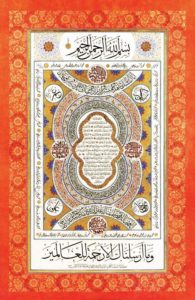 Your image is constantly before my eyes,
Your image is constantly before my eyes,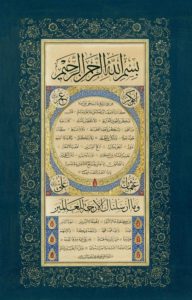 The turtle-dove sings its lament at dawn, and weeps.
The turtle-dove sings its lament at dawn, and weeps.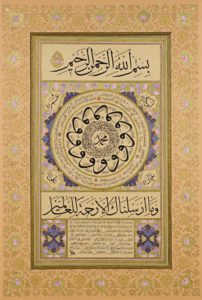 We have a way from this visible world to the Unseen,
We have a way from this visible world to the Unseen,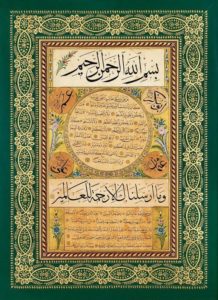 We went down to a sea, and stood upon the station of the seashore.Above that station was a sun rising in our horizon.
We went down to a sea, and stood upon the station of the seashore.Above that station was a sun rising in our horizon.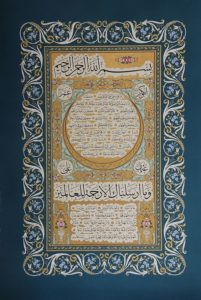 No such thing as a broken heart turning from me to You;
No such thing as a broken heart turning from me to You;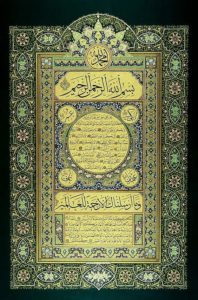 If I repeat Your Name, it is not because I fear forgetfulness,
If I repeat Your Name, it is not because I fear forgetfulness,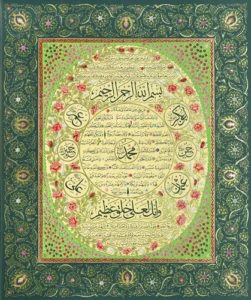 Is there any place our King is not?
Is there any place our King is not?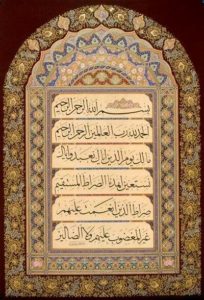 The lights of some people precede their dhikr, while the dhikr of some people precede their lights. There is the one who does (loud) dhikr so that his heart be illumined; and there is the one whose heart has been illumined and he does (silent) dhikr
The lights of some people precede their dhikr, while the dhikr of some people precede their lights. There is the one who does (loud) dhikr so that his heart be illumined; and there is the one whose heart has been illumined and he does (silent) dhikr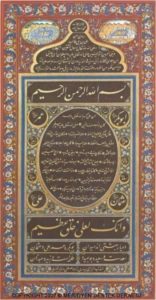 Whoever enters the Way without a guide will take a hundred years to travel a two-day journey.
Whoever enters the Way without a guide will take a hundred years to travel a two-day journey.